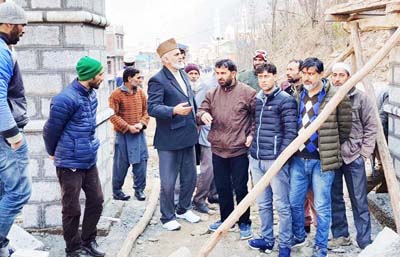Excelsior Correspondent
THATHRI, Jan 6: Senior Congress leader and MLA Inderwal, Ghulam Mohammad Saroori has urged upon the Government to give top priority to the road connectivity in hilly and remote areas.
The Congress MLA, while addressing public meetings at Thathri, Phagsoo and Khanpura said that many hilly and remote areas are still without road connectivity. He said prime requirement is to have road links to these areas for ensuring over all development. He urged upon the State Government to give top priority to the road connectivity.
While inspecting the ongoing Thathri-Kathava road constructed by PMGSY Department at a cost of Rs 22.56 crore, Saroori said that road connectivity to hilly, far flung and rural areas are the prime requirement for their growth and development. He said most of the population living in hilly areas of the Inderwal constituency has been connected with road connectivity and the work on various road projects is going on at pace.
The MLA said that peace and prosperity enables to focus on the developmental activities and carry on the infrastructure developmental projects in a time bound manner and added that he as a MLA has taken each and every step to maintain peace and tranquility besides carried forward the developmental activities smoothly across the Inderwal irrespective of caste, color, region or religion.
He also sorted out the road dispute and directed the agency to ensure road to connect Bandoga, Khanpura, Kathava villages so that problems could be mitigated.
People also raised their burning demands on the occasion which include, pending payment of wages under MGNREGA, IHHL schemes, improvement in drinking water distribution system, augmentation of power distribution system and other demands were also raised by the people on the occasion.
Later, Saroori inspected the construction work of ‘Eidgah’ under Constituency Developm-ent Funds (CDF) at Thathri. He also addressed workers meetings and expressed serious concern over the problems confronting people. He criticized the Government for its failure to address basic issues of the public.


